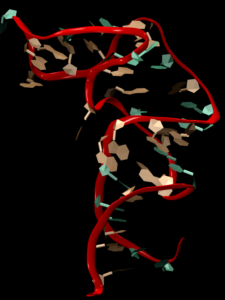Professors Conduct Research to Help Develop Antiviral Treatments for COVID-19
Two Duquesne researchers are studying the genome of SARS-COV-2, the virus that causes COVID-19, to identify molecular switches that control the virus life cycle and help guide the development of antiviral treatments.
 Dr. Mihaela Rita Mihailescu and Dr. Jeffrey Evanseck, chemistry and biochemistry professors in the Bayer School of Natural and Environmental Sciences, began their study after receiving a Rapid Response Research Grant from the National Science Foundation in April.
Dr. Mihaela Rita Mihailescu and Dr. Jeffrey Evanseck, chemistry and biochemistry professors in the Bayer School of Natural and Environmental Sciences, began their study after receiving a Rapid Response Research Grant from the National Science Foundation in April.
By better understanding how the virus progresses through its life cycle to multiply and infect other cells, the researchers intend to identify molecular switches that act as checkpoints in this progression, which could guide the development of treatments to slow or stop the virus’ replication.
“The ultimate goal of the virus is to replicate itself within the infected host cell to produce more virions, which then leave the cell to infect other cells,” Mihailescu said. “We know that the processes of making the viral proteins and replicating the RNA genome use the same RNA, so there must be some switches in the viral life cycle. The goal is to identify at least one of the molecular switches and find a way to prevent the virus from moving through the steps of its life cycle so that it can’t multiply and infect other cells.”
Mihailescu and Evanseck have extensive experience in understanding RNA-RNA and RNA-protein interactions from their research on the Hepatitis C virus and amyotrophic lateral sclerosis (ALS), also known as Lou Gehrig’s disease. Three years ago, they began collaborating on an ALS project to better understand the RNA structure’s relationship to function and pathology of the disease. When COVID-19 emerged, they realized their work with other viral systems could be helpful in understanding the disease.
“It helps that we have expertise in working with other viruses because we can use similar experimental methods to test our hypotheses,” Mihailescu said. “That said, each virus is unique.”
“The key to our research strategy is to leverage our expertise and approach of experimental biochemistry with the theory and molecular dynamics simulations to bring a complementary and fresh new approach to this complex biochemical problem,” Evanseck said. “It could also lead to the future development of new antivirals that target the genomic RNA as opposed to other strategies that target the viral proteins.”
The research team also includes Duquesne graduate students Joshua Imperatore, Kendy Pellegrene-Guarinoni, Angel Tamez and Caylee Cunningham.
